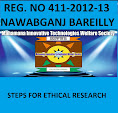नवाबगंज सब्जी सहकारी - एमआईटीडब्लूएस
महामना इनोवेटिव टेक्नोलॉजीज वेलफेयर सोसाइटी का एक कार्यक्रम है, जो विशेष रूप से किसानों, कृषि व्यवसाय और व्यापार से जुड़े लोगों, ग्रामीण युवाओं, कृषि और संबंधित विषयों में विशेषज्ञता रखने वाले अकादमिक और शोध से जुड़े लोगों के लिए बनाया गया है। इस कार्यक्रम का मुख्य उद्देश्य स्थायी कृषि पद्धतियों को बढ़ावा देना, किसानों की आय में वृद्धि करना, उत्पादन की लागत को कम करना, कृषि पद्धतियों में मूल्यवर्धन करना, किसानों और आम लोगों को जैविक खाद्य अपनाने के लिए प्रेरित करना, जैविक खेती से संबंधित अनुसंधान कार्य को बढ़ावा देना, प्रेरित करना है। और रसायनों और कीटनाशकों के भारी उपयोग को कम करने के लिए जागरूक, उर्वरकों, रसायनों और कीटनाशकों के भारी उपयोग के दुष्प्रभाव के बारे में जागरूकता, आधुनिक टिकाऊ कृषि पद्धतियों के प्रकाश में कौशल विकास, इंटर्नशिप, कार्यक्रम और अन्य शैक्षणिक, तकनीकी और क्षेत्रीय गतिविधियों का आयोजन, अन्य अनुसंधान और विकास गतिविधियां और प्रौद्योगिकी विकास, स्केलिंग और जमीनी स्तर तक अनुवाद, वर्तमान वैज्ञानिक और सामाजिक चुनौतियों की पहचान करना, समस्याओं के अभिनव समाधान सुझाना, अग्रिम और नई तकनीकों और उपकरणों के कार्यान्वयन की सुविधा प्रदान करना। हम लोगों को सलाहकारों, स्वयंसेवकों, सलाहकारों, समन्वयकों, वित्तीय और शोध भागीदारों और अन्य शोध सहयोगियों के रूप में इस सामाजिक पहल का हिस्सा बनने के लिए आमंत्रित कर रहे हैं।
https://chat.whatsapp.com/IF9NEx6KBDJK5dki2fSpfr
एक कानूनी इकाई या कानूनी रूप से मान्यता प्राप्त निकाय होने के लिए, सहकारी एफपीओ को किसी भी सहकारी समिति अधिनियम के तहत पंजीकृत होना चाहिए, जिसमें पारस्परिक सहायता प्राप्त या आत्मनिर्भर सहकारी समिति अधिनियम भी शामिल है, चाहे उसे किसी भी नाम से पुकारा जाए, संबंधित राज्य / केंद्र शासित प्रदेश या सरकार के बहु-राज्य सहकारी समिति अधिनियम के तहत। एफपीओ को किसानों द्वारा पंजीकृत और प्रशासित किया जाना चाहिए, तथा संगठन को कृषि और संबद्ध क्षेत्रों से संबंधित गतिविधियों पर केंद्रित होना चाहिए।
एफपीओ किसानों को उत्पादकता संबंधी मुद्दों, सामूहिक खेती और छोटे खेतों से निपटने में शामिल कर सकते हैं। खेती की गहनता बढ़ने से अतिरिक्त रोजगार सृजन भी हो सकता है।
पीएम किसान एफपीओ योजना 2024 के लिए कौन पात्र हैं? पेशे से किसान: आवेदन करने वाले व्यक्ति को किसान के रूप में काम करना चाहिए। भारतीय नागरिकता: केवल भारतीय नागरिक ही इस योजना के लिए पात्र हैं। न्यूनतम सदस्यता: एक मैदानी क्षेत्र में, एक किसान उत्पादक संगठन (एफपीओ) में कम से कम 300 सदस्य होने चाहिए। एफपीओ स्कीम में आवेदन करने के लिए आपको राष्ट्रीय कृषि बाजार की आधिकारिक वेबसाइट https://www.enam.gov.in पर विजिट करना है। इसके बाद आपको होमपेज पर रजिस्ट्रेशन या लॉगिन करके सभी जरूरी डिटेल्स को दर्ज करना है। सभी स्टेप्स को फॉलो करके फॉर्म सबमिट करना होगा। इस तरह आप आसानी से स्कीम में आवेदन कर सकते हैं। FPO के रजिस्ट्रेशन के लिए एफपीओ के MD या CEO या Manager का नाम, पता, ई-मेल आईडी और कॉन्टेक्ट नंबर उपलब्ध कराना होगा. साथ ही इनसे संबंधित दस्तावेज देने होंगे. इसके अलावा एफपीओ के शीर्ष अधिकारी की बैंक डिटेल्स भी उपलब्ध करानी होंगी. इनमें बैंक का नाम, ब्रांच, अकाउंट नंबर और IFSC कोड शामिल हैं.उत्पादक कंपनी के गठन के लिए कम से कम 10 या उससे अधिक सदस्य या कम से कम दो उत्पादक संस्थानों की आवश्यकता होती है और न्यूनतम 5 लाख रुपये की शेयर पूंजी होनी चाहिए। कम से कम 5 निदेशक होने चाहिए और पेशेवर प्रमाणन (सीए, सीएस, आदि) के साथ उचित पहचान और पते का प्रमाण प्रस्तुत करना आवश्यक है।केंद्रीय कृषि राज्य मंत्री कैलाश चौधरी ने कहा है कि किसान उत्पादक संगठन (FPO-Farmer Producer Organizations) भी एक लाख करोड़ रुपये के एग्रीकल्चर इंफ्रास्ट्रक्चर फंड में से लाभ ले सकते हैं. इसमें दो करोड़ रुपये का प्रावधान ग्रेडिंग, पोलीहाउस, ड्रोन व मशीनरी इत्यादि खरीदने के लिए किया गया है.
डॉ करण प्रताप सिंह राठौड़
संस्थापक अध्यक्ष
MITWS
Coordinator incharge ( Nawabganj Sabjee Cooperative)
+919971701069
+919457566259
+918630583793
यदि आप इस एसोसिएशन का हिस्सा बनना चाहते हैं, तो कृपया एनएससी-एमआईटीडब्ल्यूएस व्हाट्सएप ग्रुप से जुड़ें और हमें सहकारी के आधिकारिक सदस्य के लिए आवश्यक दस्तावेज प्रदान करें।
https://chat.whatsapp.com/IF9NEx6KBDJK5dki2fSpfr
आप एसोसिएशन के लिए अपना विवरण भेज सकते हैं या कोई प्रश्न पूछ सकते हैं।
nscmitws@gmail.com
contactmitws@gmail.com
https://nscmitws.wordpress.com

